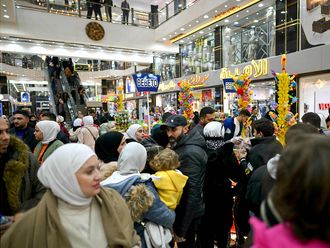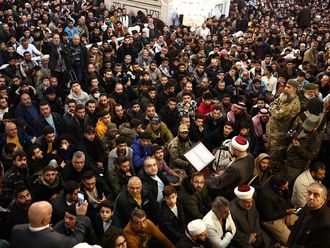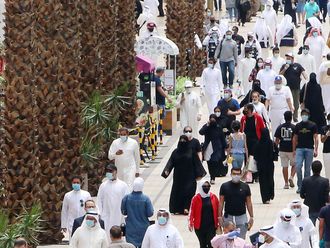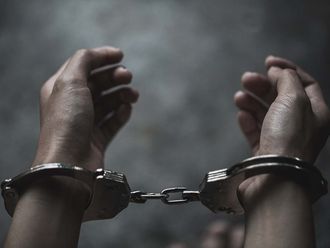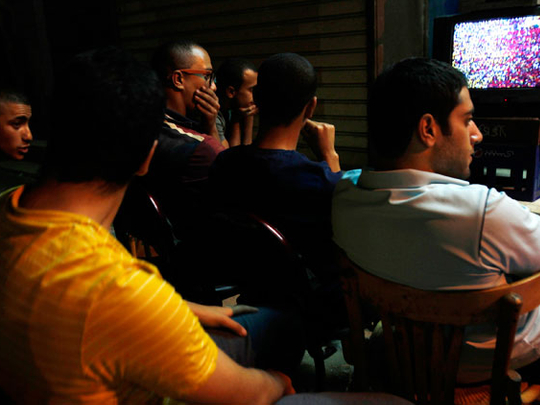
Cairo: “Why have our players been so cruel to us? We badly needed a win to give us a break from this state of frustration in the country,” fumed Fawzy Makhluf, while watching at a Cairo coffee shop an away play-off match between Egypt and Ghana for a World Cup spot.
Ghana hammered Egypt 6-1 in the first-leg match held in Kumasi on Tuesday night, shattering the Pharaohs’ dream for booking a place in Brazil’s 2014 global tournament. Egypt’s last World Cup showing was in 1990.
“The Egyptian people deserve joy after all these hard months of clashes and bloodshed,” said Makhfluf, a high-school student. “But our players have chosen to make us sad even on Eid,” he added before storming out of the café as a 89-minute goal by Ghana’s Christian Atsu sealed the visitors’ fate. The match coincided with the first day of Eid Al Adha.
The Egyptian squad appeared in the Kumasi clash disorganised with soccer gurus and fans at home blaming the humiliating defeat on the team’s tattered defence and incoherent line-up.
“This is a shameful defeat for Egypt, which was Africa’s champions seven times,” said Salah Sulaiman, a pensioner. “The whole country is in a state of loss because of political fights and economic collapse. So why should we blame the players for performing so badly on the pitch? They are Egyptians and are frustrated like [the rest of us].”
Egypt has been gripped by political turmoil, security breakdown and economic doldrums since a popular revolt forced long-serving president Hosni Mubarak to step down in February 2011.
The win of the Muslim Brotherhood leader Mohammad Mursi as Egypt’s first democratically elected president in summer of last year failed to end the country’s woes. He was accused by the mostly secular opposition of mismanaging daily problems and acting at his group’s command.
The army deposed Mursi in July after massive street protests against his rule. The move has deepened Egypt’s political divisions, with the Brotherhood condemning Mursi’s ouster as a coup and vowing to stage non-stop protests until he is reinstated.
More than 1,000 people have been killed in Egypt since Mursi’s overthrow in clashes involving his backers, opponents and security forces.
“No one in the world expected the Egyptian team to be crushed by six goals,” said Khaled Lateef, a member of the Egyptian Football Association. “Egypt has a big name in Africa’s soccer. But the blunders made by the team’s coaching staff resulted in what we saw in Kumasi.” Egypt’s sole goal came from a penalty kick converted by veteran striker Mohammad Abu Treika.
Egyptian newspapers dubbed the defeat a “nightmare”, “scandal” and “naksa” (setback).
Bob Bradley, Egypt’s US coach, was quoted in the media as taking responsibility for the rout and admitting that the second-leg match due in Cairo on November 19 will be a “mission impossible”.
Even before the Kumasi play-off, Ghana had asked the world soccer body, Fifa, to move the second leg from Cairo, citing security concerns. The game is to be held at an army stadium on the outskirts of the Egyptian capital.
Mursi’s Brotherhood has avoided commenting on the first-leg defeat after the group’s detractors accused it of being “non-patriotic” and gloating over Egyptians’ hardships.
However, the group’s website significantly quoted the pro-Brotherhood activist Yasser Nejm as calling the Kumasi thrashing a “gift from God”. “It is out of God’s mercy that Egypt did not win over Ghana...otherwise we would have celebrated with the killers,” Nejm wrote, apparently referring to the country’s army-backed authorities whom Islamists accuse of ordering deadly security swoops on Mursi’s supporters.



